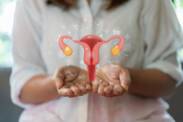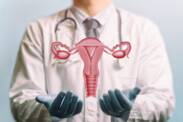Pohlavné choroby
Reproductive disorders include
- Male genital disorders
- Female genital disorders
- The category you were looking for was not found. Please try another one.
- List is empty.

Breast cancer
Breast cancer is the most common cancer globally and is also the leading cause of death among cancers in women. Worldwide, breast cancer is the leading type of cancer in women, accounting for 25% of all cases. In 2018, it resulted in 2 million new cases and 627,000 deaths. It affects women, but rarely men. Breast cancer mortality is declining due to regular preventive check-ups.

Cervical Cancer
Cervical cancer is a disease that can be caught during regular gynaecological examinations by screening, which is carried out once a year in the gynaecologist's office. When caught early, it is one of the most successfully treatable cancers.

Chlamydia Infection
A chlamydia infection is a widespread infection that affects women and men alike. It is caused by bacteria of the genus Chlamydia or Chlamydophila. They cause a wide range of infectious diseases of the genitals, eyes, and respiratory system.

Breast cyst - a lump in the breast
A cyst in the breast is a hollow anatomical formation of varying size. It is separated from its surroundings by its own wall. The inside of the cyst may be filled with fluid or connective tissue. It may have several causes.

Cyst on the ovary
An ovarian cyst is a fluid-filled sac. It is surrounded by a thin layer of tissue. It occurs in the ovary or on its surface.

Ectopic pregnancy
An ectopic pregnancy occurs when a fertilized egg nests outside the uterus, most often in one of the ovaries. Why does this happen, where can the egg nest and what are the risks?

Enlarged Prostate
Benign enlargement of the prostate is one of the most common urological diagnoses in men. It is accompanied by specific symptoms that can impair quality of life. Can prostatic hyperplasia be combated? When is it advisable to see a doctor?

Female Infertility
Female infertility means that it is not possible for a woman to become pregnant.

Genital herpes
Genital herpes is one of the most common sexually transmitted diseases. It is an easily transmissible infectious disease occurring in both men and women. How to recognize genital herpes correctly? What are the ways in which the virus can be transmitted and what treatment options are available?

Gonorrhea
Sexually transmitted diseases include infectious diseases whose spread is closely linked to sexual intercourse and other sexual practices. They are transmitted by mucous secretions, blood, saliva or semen. One of the most common is gonorrhoea.

Hydrocell
Hydrocele is caused when a large amount of fluid accumulates between the testicular lining. It is manifested by swelling of the scrotum.

Inflammation of the Ovaries and Inflammation of the Uterine Appendages
Inflammation of the ovary is a gynecological infection that often occurs simultaneously with inflammation of the fallopian tube, either by extension of the inflammation taking place in the vagina and uterus, or by inflammation of the surrounding organs. Most ovarian infections are caused by bacterial infection. Bacteria enter the ovary through the vagina or through the bloodstream.

Inflammation of the prostate - prostatitis
Prostatitis is the lay name for inflammatory processes in the prostate from various causes and diseases. It is a urological-sexual problem in men. Why does prostatitis arise and what are all the possible causes?

Endometritis
Endometritis, i.e. inflammation of the uterus, is a bacterial infectious disease that most often affects women of working age between 20 and 30 years of age, often after childbirth or miscarriage, but can also affect older women.

Male infertility
Infertility affects up to 15% of couples. Male infertility is becoming a more common problem every year. What are all the possible causes of reduced male fertility?

Mammary Gland Inflammation
Inflammation of the breast is manifested by a painful and uncomfortable sensation in the breast. It most commonly affects breastfeeding women, but can also occur in non-breastfeeding women and men of any age. It is often caused by an infection that develops in the breast tissue.

Menopause
The menstrual cycle is a complex happening in a woman's body, the task of which is to prepare the body for becoming pregnant. At a certain age in a woman's life, the body is no longer capable of natural fertilization and bearing offspring. In this case, the hormonal system stops the menstrual cycle.

Uterine myoma
Uterine fibroids are the most common benign tumor of the uterine musculature in women. What is it and how does it manifest itself? Can it be dangerous?

Ovarian cancer
Ovarian cancer is a common cancer in women. It is the seventh most common cancer in women worldwide. It is one of the most dangerous diseases of the female reproductive organs. It can affect any woman, regardless of age.

Phimosis and paraphimosis
The foreskin, the skin protection of the glans, is part of the male reproductive organ. A narrowed foreskin can cause health complications in childhood and adulthood. What is the difference between phimosis and paraphimosis of the foreskin?









